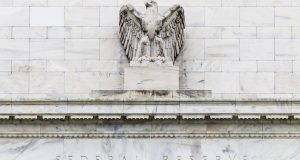Continuing a trend started by the ""FDIC"":http://www.fdic.gov/, the ""Securities and Exchange Commission"":http://sec.gov/ (SEC) filed suit to recover losses from a handful of former bank officials it accuses of concealing massive loan losses for their financial institution before it went bust in 2008.
[IMAGE]The SEC lodged the ""complaint"":http://www.sec.gov/litigation/complaints/2011/comp22121.pdf against onetime CEO Thomas Wu, ex-COO Ebrahim Shabudin, and former senior officer Thomas Yu, alleging acts of securities fraud during their tenure with San Francisco-based United Commercial Bank (UCB) that concealed some $65 million in financial statements as actual losses neared $200 million.
An SEC ""statement"":http://sec.gov/news/press/2011/2011-202.htm said that another official, former CFO Craig On, settled with the agency without ""admitting or denying the allegations"" in exchange for enjoining professional requirements, a $150,000 penalty, and a five-year prohibition from service as an accountant before the SEC.
By making false and misleading statements, the agency said, all four former officials exacerbated circumstances surrounding the nation's ninth-largest bank failure ├â┬ó├óÔÇÜ┬¼├óÔé¼┼ô a mess that state regulators later closed and handed off to the FDIC, which paid out $2.5 billion to corral fallout from UCB.
[COLUMN_BREAK]""Instead of accurately recording and then reporting these losses, and increasing its loan loss reserve as required by accounting rules, these executives took steps to delay disclosure of the full extent of the losses the bank faced,"" the agency said in the complaint.
""Today's charges reflect an all too familiar pattern ├â┬ó├óÔÇÜ┬¼├óÔé¼┼ô corporate executives once seen as rising stars embrace deception to avoid losses and conceal negative news, with investors and the FDIC insurance fund left to pick up the pieces,"" ""Robert Khuzami"":http://www.whorunsgov.com/Profiles/Robert_Khuzami, enforcement director for the SEC, said in a statement. ""But accountability for these executives begins today.""
Also remarking about the case, Marc Fagel, director of the SEC's San Francisco regional office, added in the statement that the ""investigation shows how federal regulators can work together to ferret out fraud by the guardians of financial institutions entrusted to deal honestly with public investors.""
The suit caps a story of staggering growth and failure for UCB and the former officials. The financial institution went under with more than $13 billion in assets, with those for loans at $8.6 billion, after taking the leap from small startup to international success story over a period of 10 years.
According to the complaint, UCB earned name recognition as it gobbled up several smaller banks and became the first U.S. bank stateside to acquire and wholly own a financial institution in the People's Republic of China.
The suit portrayed Wu as ""a rising star in the banking industry"" whom one major accounting firm once named Entrepreneur of the Year, and who _Forbes_ included on a list of the 25 most notable Chinese-Americans in American business.
The SEC also said that parallel charges will follow for other former bank employees, with the FDIC stepping up enforcement actions against 13 alleged violators.

 theMReport.com Your trusted source for mortgage banking news
theMReport.com Your trusted source for mortgage banking news








